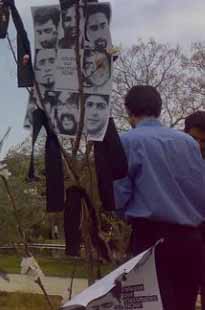| Home > 30 years human rights in Iran > Articles of the Universal Decleration of Human Rights > Iran lacks a clear understanding of Human Rights | |||
Iran lacks a clear understanding of Human Rights Abdol-Fatah Soltani Article 2: Everyone is entitled to all the rights and freedoms set forth in this Declaration, without distinction of any kind, such as race, color, sex, language, religion, political or other opinion, national or social origin, property, birth or other status. Furthermore, no distinction shall be made on the basis of the political, jurisdictional or international status of the country or territory to which a person belongs, whether it be independent, trust, non-self-governing or under any other limitation of sovereignty. Article 2 of the UN Universal Declaration of Human Rights sets forth the principles of equality and nondiscrimination. Under this law, discrimination on the basis of language, religion, sex, color, race, political opinion or other views are prohibited. These principles, which also appear in the International Covenant on Civil and Political Rights, are among the most fundamental rights of every human being. Under this law, everyone is entitled to respect and protection, irrespective of religion, skin color, race, nationality or political views and convictions. Some of this language also appears in Articles 19 and 20 of the Constitution of the Islamic Republic of Iran. There are two notable exceptions however. The Iranian Constitution does not protect against discrimination on the basis of religion or political views. This is an important difference between the Iranian Constitution on the one hand and the Universal Declaration of Human Rights and the International Covenant on Civil and Political Rights on the other. According to the Article 207 of the Islamic Criminal Code (Sharia
law), Killing a Muslim calls for revenge killing(Ghesas, or Mani Nieystani What is declared in Article 2 of the Universal Declaration of Human Rights is that all humans have been created equal and all the visible and discernible differences that exist between them, such as their socioeconomic background, color, language, ethnicity or nationality, may not be used as a basis to discriminate against or among them. This is a basic and accepted right in most modern societies. Even though it is vaguely recognized in the Constitution of the Islamic Republic of Iran, in practice, it has not been observed in our country. The Apartheid regime existed in South Africa until a few years ago. But widespread sexual discrimination continues to exist in much of the world today. Women are subject to discrimination in many countries and they have no legal recourse to redress it. The laws that exist to preserve the rights and privileges of men remain a world apart from those that exist to protect women. Moreover, in the Islamic Republic of Iran, as well as in many Arab states, a woman is not accorded the same social status as a man. Furthermore, members of different tribes and ethnic groups are sometimes at a disadvantage in terms of general living conditions. Despite the clear stance of Article 2 on the subject, certain groups trample upon the rights of other less dominant groups. Iran’s Sunnis, for example, do not enjoy rights enjoyed by their Shiite counterparts. They are even prohibited from having a mosque in Tehran. They are also barred from most government jobs. What’s more, religious minorities such as Zoroastrians, Christians and Jews are prohibited from holding key positions in government. Other religious minorities, not directly referred to in the Constitution, fail to have basic rights as citizens. In my view, a monitoring agency should be put in place to oversee government action in this area. In many countries, governments are the most notorious actors when it comes to violating these rights. There should be a system of political parties, civil society and NGOs in every country. Delegates from these bodies will be representative of the will of the people. They will assemble in an international forum and take to task governments and political leaders. They may even prosecute them for violating human rights. These governments should have to answer for their repeated and systematic breach of international law, as well as for the violation of the Universal Declaration of Human Rights and the International Covenant on Civil and Political Rights. Otherwise governments have little incentive to change their behavior. Others may accentuate the problem by codifying these practices through discriminatory laws or legislation. The system will perpetuate itself and states will move slowly, if at all, toward observing Article 2 of the Universal Declaration of Human Rights, the International Covenant on Civil and Political Rights, or any other nondiscriminatory practice. I hope to see the day when people can hold their governments accountable for such blatant violations.
|
|||
 |













